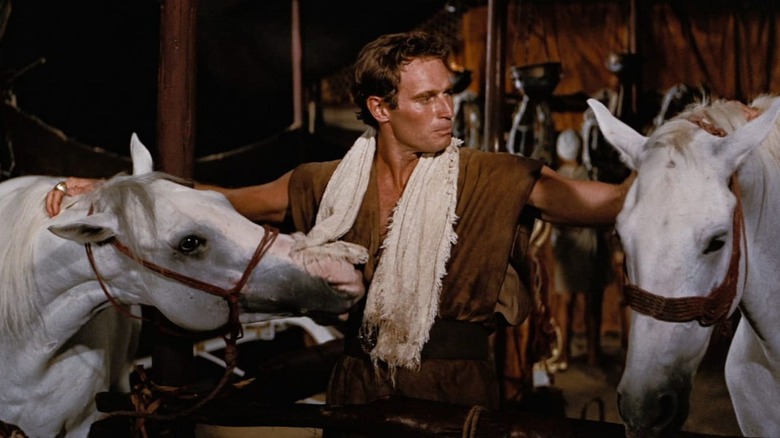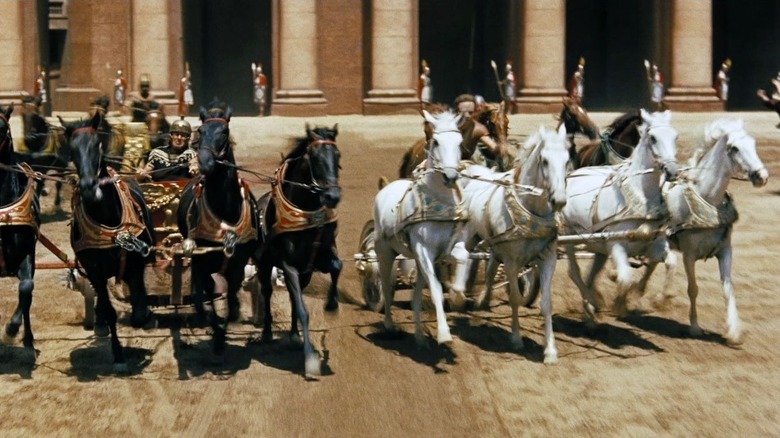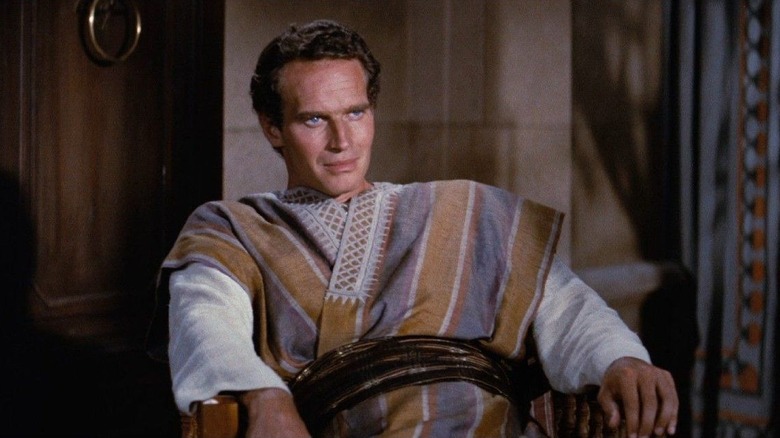Charlton Heston Wouldn't Agree With The Tom Cruise School Of Stunt Acting
To clarify right away: A stunt performer did not die during the production of "Ben-Hur."
For many years, it was rumored that Stephen Boyd's stunt double for the film's famous chariot race sequence was either thrown from a chariot, or trampled by horses and crushed (depending on which rumor one might have heard). The rumor was likely started by stunt performer Nosher Powell who, in his autobiography "Nosher," stated that a stuntman did indeed die. The fact is — confirmed in Emilie Raymond's hero-worshippy 2006 book "From My Cold, Dead Hands: Charlton Heston and American Politics" — no stunt performers died during "Ben-Hur," and the only injury sustained was to Charlton Heston's stunt double Joe Canutt, who thwacked his chin on a chariot after he was thrown in the air. Canutt lived until 1986.
The chariot sequence in "Ben-Hur" is one of the more notable examples of high-profile stunt work in Hollywood history, as well as one of cinema's great action sequences overall. The feats achieved in the scene are all first rate and will thrill the most jaded action fan. Heston did not perform any of his own stunts, although Boyd famously did, putting on a special suit of armor in order to be dragged behind a chariot. But worry, not, "Ben-Hur" fans, as it was merely a dummy being trampled under the thundering horse hooves.
In 1997, Heston recorded an interview with the BBC, and he seems to have overlooked Boyd's derring-do, proclaiming that actors simply do not — perhaps should not — perform their own stunts. Now we live in an age when Tom Cruise routinely and deliberately puts his life on the line to perform increasingly wild stunts for "Mission: Impossible" movies. Heston, infamously stodgy and conservative in his attitudes, would likely have heard nothing of that.
'The actor who tells you he does his own stunts is either an idiot or a liar'
Charlton Heston wasn't being reductive about the talents of stunt performers. Indeed, he seemingly wanted to give stunt coordinators and second unit directors their due when it came to their contributions to action scenes in movies. Heston speaks nothing of an actors' ego, but he does clarify that actors who do their own stunts are not to be credited as the centerpiece of a stunt-heavy scenario. Heston points out that he knows a small amount about horses, but never took control of a stunt sequence just to show off. Indeed, Heston never even wanted to direct, and once said in an interview with Dick Cavett, that he preferred to assert control over a production on a casting, editing, and script level. Heston still liked to control a film he worked on, but never as a director, nor as a stuntman. Heston said:
"The actor who tells you he does his own stunts is either an idiot or a liar. Now, there are shots you can do. I'm a modestly competent horseman ... And the stunt coordinator, or the second unit director, are always the people who know everything that needs to be known about it. And I always say, 'Can I do this shot?' And they'll say, 'Yeah, you shouldn't do this one Chuck,' I said 'Okay.' And if they say 'Yeah, you can do this,' I do it, it's very simple."
Heston may have asked, but the stunt coordinators said no. So he didn't.
The old Heston and the new Heston
Heston, it should be noted, was once a more-left-leaning liberal who served as president of the Screen Actors Guild from 1965 until 1971. He cared about actors' rights, and even marched for Civil Rights causes throughout the 1960s. By the time he made the above statement in 1997, his politics had shifted dramatically in the opposite direction, and he became head of the National Rifle Association, frequently giving aggrieved speeches about vague culture war stuff. Latter-day Heston became, in many ways, the central celebrity face of the modern conservative movement.
Both versions of Heston, however, seem to believe in the rights of actors and making sure credit is given where it was due. It's a pity that Heston seems to have forgotten Boyd in his statement.
Heston, in the same 1997 interview, bemoaned the changing face of Hollywood, and how too much money was being spent. In 1997, an inexpensive film cost $23 million, whereas "Ben-Hur" cost a mere $14 million. He complained that a film like "Ben-Hur" couldn't be made in 1997, largely ignoring that historical epics like "Braveheart" were still winning awards. Incidentally, a new film version of "Ben-Hur," directed by Timur Bekmambetov, would be made in 2016 with a budget of about $100 million. It went unseen by the masses, and is one of the biggest box office bombs of all time.
Heston's comments, of course, didn't account for Hollywood in 2016 — he died in 2008 — but he was correct in that large-scale Roman epics are indeed still out of vogue. We can give him that much.


